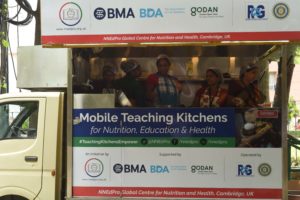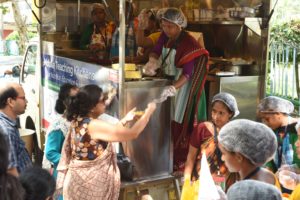Mobile Teaching Kitchen: Nutrition on wheels
Nutritional education in India should be given utmost importance as one in four children in the most populous cities is malnourished.
According to a new report by Urban HUNGaMA (hunger and malnutrition) released on February, 2018, by Naandi Foundation, one in four children in India’s most populous cities is malnourished, and mothers’ education, feeding patterns and government service delivery determines child nutrition in addition to household wealth.
In an initiative launched by Indian Prime Minister Narendra Modi, September will be observed as Nutrition Maah (or month) with the aim of reaching every household with the message of nutrition — ‘har ghar poshan tyohar’ (every house a celebration of nutrition).
Another initiative that seems small but can have a big impact, has been launched by the Need for Nutrition Education/Innovation Programme (NNEdPro) and its Global Centre for Nutrition and Health in Cambridge, along with Remedy Clinic Study Group (RCSG) Kolkata and Inner Wheel Club of Greater Calcutta (IWCGC). This is the Mobile Teaching Kitchen Project – empowering 12 mothers from two slums in Kolkata on August 23. These women were trained by dietitians and IWCGC members for six months, learning how to make healthy, nutritious and tasty food at low cost.
Providing nutrition
This work arose from the idea of tackling malnutrition in the slums of Kolkata. With over 1.5 million people living in 3,500 unregistered slums in Kolkata the concept of a mobile teaching kitchen was envisaged to serve as a hub for nutrition and health education as well as a micro-enterprise. This project won the 2018 Cambridge University Research Incubator award.
Professor Sumantra Ray, NNEdPro founding chair and executive director in Cambridge, told Media India Group, “The social intervention was to see what happens if we teach these mothers from urban slums to become change drivers not only for their own community but beyond. The Mobile Teaching Kitchen will take them to different parts of the city and spread messages on nutrition and health. In the last six months we are collecting detailed data for analysis. We will seek to scale this model and next year we will ask people to start adopting the things that work.”
“The project was made successful with the initiative of Dr Minha Rajput Ray, also responsible for core funding for this project along with efforts over the past six months by Dr Harrison Carter, Dr Luke Buckner and Ananya Ria Roy, all from the UK. This is a micro-model; once it is viable we can adapt this from urban to rural areas within a separate project that has funding of GBP 7.8 million over four years,” added Sumantra Ray.
Kanika Mondol, a 26-year-old mother from one of the slums in Kolkata told Media India Group, “I have been taking training from them for the past one and a half years. They gave us basic knowledge on how to prepare healthy and nutritious food and what food has the highest protein value for us and will benefit our kids.”
Sudeshna Maitra-Nag, chief dietician of Peerless hospital and a member of NNEdPro, who was present at the event, said, “They are selling high protein nutritious food at a lower cost. Their menu is of high nutritional value.”
The NNEdPro Global Centre for Nutrition and Health is an international and interdisciplinary think-tank, training academy and knowledge network that is anchored in Cambridge and is dedicated to nutrition and health improvement via education, research, evaluation and advocacy.
The project will complete five years of operations in India by February 2019, when they will share the detailed evaluation of this micro-model aiming to come out with a bigger initiative to fight malnutrition in India.











